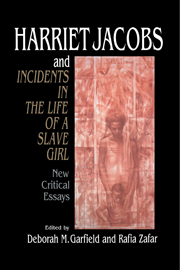Book contents
- Frontmatter
- Contents
- Introduction: Over-exposed, Under-exposed: Harriet Jacobs and Incidents in the Life of a Slave Girl
- “I Disguised My Hand”: Writing Versions of the Truth in Harriet Jacobs's Incidents in the life of a Slave Girl and John Jacobs's “A True Tale of Slavery”
- Through Her Brother's Eyes: Incidents and “A True Tale”
- Resisting Incidents
- Manifest in Signs: The Politics of Sex and Representation in Incidents in the life of a Slave Girl
- Earwitness: Female Abolitionism, Sexuality, and Incidents in the life of a Slave Girl
- Reading and Redemption in Incidents in the Life of a Slave Girl
- Harriet Jacobs, Frederick Douglass, and the Slavery Debate: Bondage, Family, and the Discourse of Domesticity
- Motherhood Beyond the Gate: Jacobs's Epistemic Challenge in Incidents in the Life of a Slave Girl
- “This Poisonous System”: Social Ills, Bodily Ills, and Incidents in the Life of a Slave Girl
- Carnival Laughter: Resistance in Incidents
- Harriet Jacobs, Henry Thoreau, and the Character of Disobedience
- The Tender of Memory: Restructuring Value in Harriet Jacobs's Incidents in the Life of a Slave Girl
- Conclusion: Vexed Alliances: Race and Female Collaborations in the Life of Harriet Jacobs
- List of Contributors
- Index
- CAMBRIDGE STUDIES IN AMERICAN LITERATURE AND CULTURE
Harriet Jacobs, Frederick Douglass, and the Slavery Debate: Bondage, Family, and the Discourse of Domesticity
Published online by Cambridge University Press: 22 January 2010
- Frontmatter
- Contents
- Introduction: Over-exposed, Under-exposed: Harriet Jacobs and Incidents in the Life of a Slave Girl
- “I Disguised My Hand”: Writing Versions of the Truth in Harriet Jacobs's Incidents in the life of a Slave Girl and John Jacobs's “A True Tale of Slavery”
- Through Her Brother's Eyes: Incidents and “A True Tale”
- Resisting Incidents
- Manifest in Signs: The Politics of Sex and Representation in Incidents in the life of a Slave Girl
- Earwitness: Female Abolitionism, Sexuality, and Incidents in the life of a Slave Girl
- Reading and Redemption in Incidents in the Life of a Slave Girl
- Harriet Jacobs, Frederick Douglass, and the Slavery Debate: Bondage, Family, and the Discourse of Domesticity
- Motherhood Beyond the Gate: Jacobs's Epistemic Challenge in Incidents in the Life of a Slave Girl
- “This Poisonous System”: Social Ills, Bodily Ills, and Incidents in the Life of a Slave Girl
- Carnival Laughter: Resistance in Incidents
- Harriet Jacobs, Henry Thoreau, and the Character of Disobedience
- The Tender of Memory: Restructuring Value in Harriet Jacobs's Incidents in the Life of a Slave Girl
- Conclusion: Vexed Alliances: Race and Female Collaborations in the Life of Harriet Jacobs
- List of Contributors
- Index
- CAMBRIDGE STUDIES IN AMERICAN LITERATURE AND CULTURE
Summary
My master had law and power on his side; I had a determined will. There is might in each.
Harriet JacobsThe kindness of the slave-master only gilds the chain of slavery, and detracts nothing from its weight or power.
Frederick DouglassThe power of the master must be absolute to render the submission of the slave perfect.
Judge Thomas RuffinUlrich Bonnell Phillips was the earliest, most widely read, and most influential twentieth-century historian of Afro-American slavery. An extraordinarily well-read, well-educated, shrewd, and intelligent white native of South Carolina, he was also an apologist for slavery, a man who believed that slavery was just and right because Africans were an inherently inferior people and slavery offered the best possibility for civilizing them. He was thus a participant – a key one, while ostensibly merely writing history – in the slavery debate. Although he wrote many decades after the publication of the narratives here considered – those of Harriet Jacobs and Frederick Douglass – he is still engaged in struggle with them. They join with many others before and after them in a debate of long standing about what slavery is, about its nature or its character.
Phillips's book, American Negro Slavery (1918), his first major salvo in the debate, emerged from a tradition of thinking about Southern slavery that began long before he first drew breath. The tradition's inception extends back to the eighteenth century, when slaveholders responded to attacks on slavery by attempting to justify slaveholding to themselves and to the world.
- Type
- Chapter
- Information
- Harriet Jacobs and Incidents in the Life of a Slave GirlNew Critical Essays, pp. 156 - 178Publisher: Cambridge University PressPrint publication year: 1996
- 8
- Cited by



